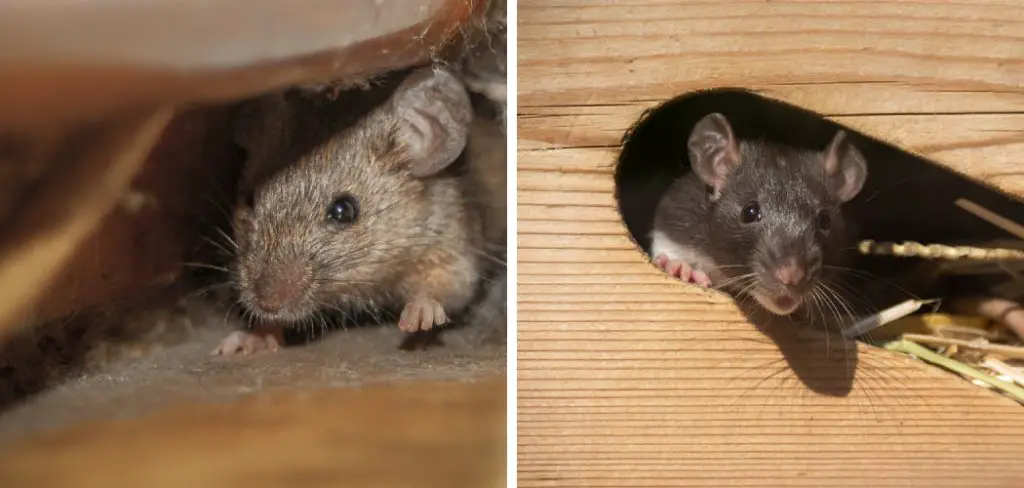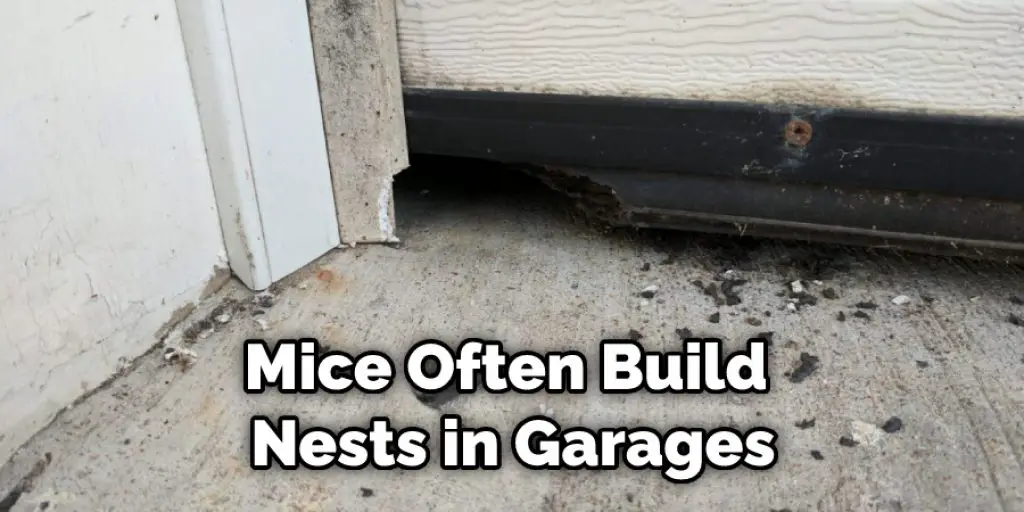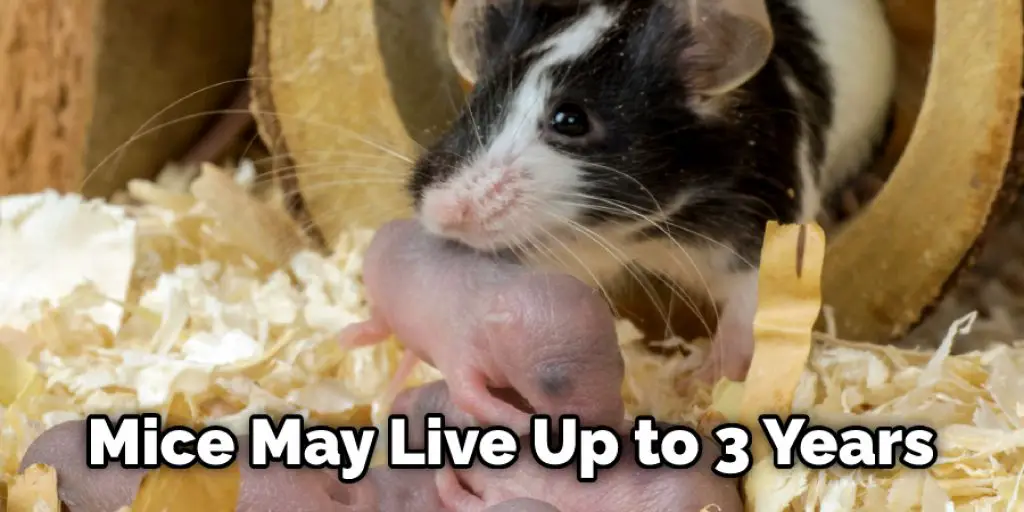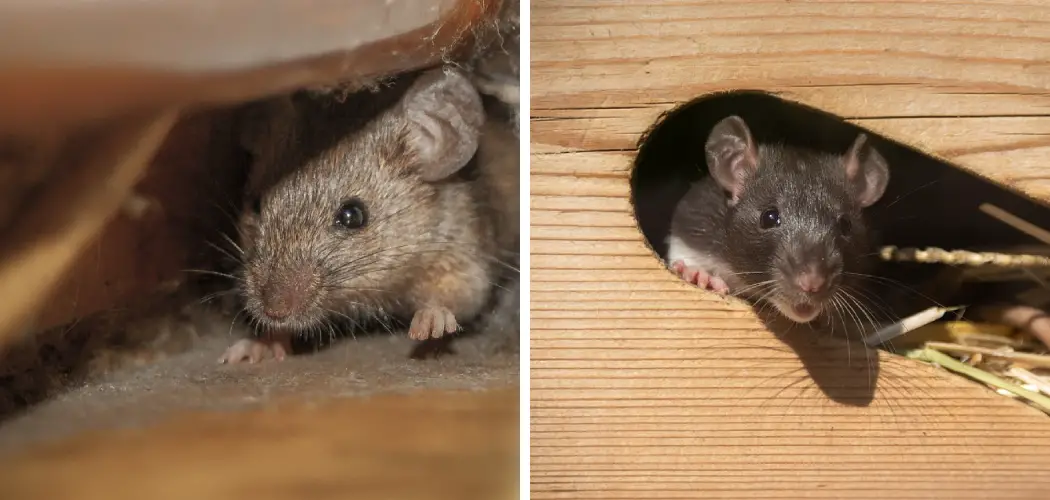Mice are a common problem in homes, and if you’re unlucky enough to have them invade your garage, they can be a real nuisance. Not only are they an unsightly sight, but mice can also damage property and spread disease. Fortunately, you can take steps to get rid of mice from your garage and keep them from returning. In this blog post, we’ll discuss how to get rid of mice from garage and prevent their return. So read on to learn more!

Summary: If you are dealing with a mouse problem in your garage, there are several steps you can take to get rid of them. Start by decluttering and cleaning the garage to eliminate potential nesting areas. Then, seal any cracks or holes that mice can use to enter the garage. Set mouse traps or use a mouse repellent to deter them from returning.
Why Mice Come Into My Garage?
Mice come into garages for several reasons. They may be looking for food, shelter, or warmth. Mice are also attracted to places with a lot of clutter, as this provides them with good cover. If you have a cluttered and messy garage, it’s more likely that you’ll have a mouse problem.
What Do Mice Look Like?
Mice are small rodents with a pointed nose, small black eyes, and large ears. They usually have light brown or grey fur, but some mice may be brown or black. Mice typically grow to be around 3-4 inches long (including the tail) and weigh around 1/2 ounce.
Mice can be found in various places, both indoors and outdoors. They might live in your walls, in your attic, under your floors, or even in your garage.
How to Get Rid of Mice from Garage Step by Step Guide
Step 1: Identify the Signs of Mice Infestation
Before taking any action, it’s important to confirm the presence of mice in your garage. Look for signs such as droppings, gnaw marks on objects, shredded paper or insulation, and a musty odor. These indications will help you determine the severity of the infestation and guide your approach for eliminating the mice.
Step 2: Remove Potential Food Sources
Mice are attracted to accessible food sources. In your garage, ensure that all food items are stored in tightly sealed containers made of metal or glass. Remove any spilled food, including pet food or birdseed. Clean up crumbs and food debris from shelves, floors, and corners of the garage. Denying mice access to food will make your garage less enticing to them.
Step 3: Seal Entry Points
Inspect your garage for any openings that mice can use to enter. Look for gaps around doors, windows, vents, and utility lines. Seal these openings using steel wool or caulk, ensuring a tight fit to prevent mice from squeezing through. Pay attention to smaller openings, as mice can fit through holes as small as a dime.
Step 4: Install Door Sweeps
To further prevent mice from entering, install door sweeps at the base of all exterior doors. These sweeps provide a barrier and block the gaps beneath the doors, making it difficult for mice to get inside. Ensure the sweeps are in good condition and make contact with the ground when the door is closed.
Step 5: Declutter and Organize
Mice thrive in cluttered environments where they can find hiding spots. Declutter your garage by organizing and properly storing items. Use plastic storage containers instead of cardboard boxes, as mice can easily chew through cardboard. Keep the floor clear and avoid creating spaces where mice can nest.
Step 6: Set Traps
Traps are an effective method for catching mice. Place snap traps or live traps in areas where you’ve observed mouse activity. Position them along walls, near potential entry points, and close to areas with droppings. Bait the traps with peanut butter, cheese, or other enticing food items. Check the traps daily and remove any captured mice.
Step 7: Use Ultrasonic Repellents
Ultrasonic repellents emit high-frequency sounds that are unpleasant to mice and can deter them from staying in your garage. Install ultrasonic devices in the corners or near areas frequented by mice. Follow the manufacturer’s instructions regarding placement and coverage area for optimal effectiveness.
Step 8: Employ Natural Deterrents
Certain natural substances can act as deterrents to mice. For example, peppermint oil, soaked cotton balls with peppermint oil, or cloves can help repel mice due to their strong scent. Place these deterrents near mouse entry points or areas of activity. Replace or refresh them regularly to maintain their effectiveness.
Step 9: Clean and Disinfect
Mice leave behind pheromone trails that can attract other mice. Clean and disinfect your garage to remove these trails and discourage further infestation. Use a mixture of bleach and water to wipe down surfaces, especially areas with mouse droppings or urine. Wear gloves and a mask when handling mouse-infested materials.
Step 10: Seek Professional Help (If Needed)
If your efforts to eliminate mice from your garage are unsuccessful or if you have a severe infestation, it may be necessary to seek professional assistance. Pest control professionals have the expertise and knowledge to address more complex mouse infestations. They can assess the situation, recommend appropriate treatment options, and provide ongoing monitoring and prevention strategies.
Step 11: Regular Maintenance and Prevention
Even after successfully eliminating mice from your garage, it’s important Step 11: Regular Maintenance and Prevention (continued)
Even after successfully eliminating mice from your garage, it’s important to maintain a proactive approach to prevent future infestations. Follow these steps to keep your garage mouse-free:
- Continue practicing good hygiene by keeping the garage clean and free from food debris. Regularly sweep the floors and wipe down surfaces.
- Inspect the garage periodically for any new entry points or signs of mouse activity. Seal any openings or gaps that you may find.
- Trim vegetation and bushes near the garage to eliminate potential hiding places for mice.
- Store firewood and other materials away from the garage, as they can provide shelter for mice.
- Consider installing motion-activated lights or sensors around the garage exterior to deter mice and other pests.
- Monitor the garage for any signs of a reinfestation, such as droppings or gnaw marks. Take immediate action if you notice any activity.
- If you have a persistent mouse problem, consult with a professional pest control service to assess the situation and provide tailored recommendations.
By following these steps and maintaining a vigilant approach, you can effectively get rid of mice from your garage and prevent future infestations. Remember, consistency and proactive measures are key to keeping your garage mouse-free.
In conclusion, eliminating mice from your garage requires a combination of preventive measures, proactive steps, and thorough cleaning. By removing potential food sources, sealing entry points, setting traps, using deterrents, and practicing regular maintenance, you can successfully get rid of mice and create an environment that is less attractive to them. In cases of severe or recurring infestations, it’s advisable to seek professional help. With persistence and diligence, you can regain control of your garage and keep it free from mice.
Signs of Mice in a Garage
Most people are unaware that they have mice in their garage until they see evidence of these pests. Mice leave behind droppings wherever they travel, so this is usually the first sign that you have an infestation. Other signs include chewing up packaging or food, nests made out of insulation or other materials, and hearing scurrying noises in the walls or ceiling.
The first step to getting rid of mice in your garage is to figure out if you have a mouse problem. Look for the following signs:
Droppings
Mice leave behind droppings wherever they go. If you see small, dark pellets in your garage, it’s a good indication that mice are present. Nests: Mice build nests out of soft materials like insulation and fabric. If you find a nest in your garage, it’s a sure sign that mice are living there.
Footprints
Mice tend to leave footprints in the form of small, dark droppings. So if you see any droppings around your garage, this is a sure sign that you have a mouse problem.
Chewing
Mice love to chew, and your garage is likely full of things they can gnaw on. From food to insulation, mice will chew through just about anything to get what they want.
Gnawed Packaging or Food
One of the most common signs of a mouse infestation is gnawed packaging or food. So if you notice that your food has been chewed, there’s a good chance you have rodents living in your garage.
Gnawed Wires
Mice love to gnaw on electrical wires, which can cause a fire in your garage. If you have any exposed wires, cover them with rubber or metal sheathing.
Nests

Mice will often build their nests in garages, using insulation, paper, and other materials to create a cozy home. If you find a nest, there are likely mice present. Remove the nest and block off any openings the mice could use to get back in. If you want to know more about how to get rid of mice from garage, keep reading.
What Causes Mice in a Garage
There are a few different reasons why mice might enter your garage. One possibility is that they’re looking for food. Mice are attracted to any food source, so if you have any food stored in your garage, they may be coming in search of it. Another possibility is that they’re seeking shelter from the cold weather. If your garage is warm and dry, it can be an attractive place for mice to nest.
Some Reasons:
- They’re looking for food
- They’re seeking shelter from the cold
- Your garage is an attractive place to nest
How to Prevent Mice in a Garage
1. Keep the Landscaping Around the Foundation
The first step to getting rid of mice is to take away their hiding places. Mice love to live in piles of wood, leaves, or other debris. If you have any of these around your foundation, get rid of them. It would help if you also trimmed back any trees or shrubs close to the house. These can provide a bridge for the mice to get from the ground to your home.
2. Keep Food Sealed or Out of The Garage
Mice are attracted to food sources, so the best way to prevent them from coming into your garage in the first place is to make sure there is no food for them to eat. Keep all food sealed in airtight containers and stored in a different area of your home, such as the kitchen pantry. If you must keep food in the garage, put it in high, inaccessible places where mice can’t reach it.
3. Commercial Rodent Repellant Chemicals
You can also go the chemical route to get rid of mice from the garage. There are several products on the market that work as rodent repellents. Some are for indoor use, others for outdoor use. You can find these products at your local hardware store or online.
4. Peppermint Is a Natural Mouse Deterrent
One of the easiest ways to get rid of mice from your garage is by using peppermint. You can either purchase peppermint oil or create your mix by adding a few drops of peppermint oil to water. Spray the solution around your garage, and the mice will avoid the area.
5. For Another Eco-Friendly Solution

If you are looking for another eco-friendly solution, consider using peppermint oil. Peppermint oil is a natural mouse repellent and can be found at most stores. You have to put a few drops of the oil on a cotton ball and place it where the mice are entering or exiting your garage. The strong smell will keep the mice from coming near.
Mice vs. Rats What’s the Difference?
Mice and rats may look very similar, but some key differences between the two species. Here are some of the most important distinctions:
- Mice are smaller than rats. A typical mouse is about 3-4 inches long, while a rat can be 10 inches long.
- Mice have pointy noses and small ears, while rats have blunt noses and large ears.
- Mice are typically brown or light gray, while rats can be black, brown, or white.
- Mice prefer to live in small spaces, while rats are more comfortable living in open areas.
- Mice are mostly active at night, while rats are active both during the day and at night.
- Mice eat mostly grains and seeds, while rats eat various foods, including meat.
When to Call a Pro?
Mice can be pesky little creatures, and it can be tough to get rid of them on your own. If you have a mouse problem and struggle to get rid of them, it might be time to call in a professional. A pro will have the experience and tools necessary to get rid of the mice quickly and effectively and will also be able to help prevent them from returning in the future. Keep reading for more information about how to get rid of mice from garage.
Frequently Asked Question
Where Do Mice Come From?
Mice are small rodents that are often found in the wild. They’re attracted to areas where there is food and shelter. This means that you may find them in your garage, especially if it’s cluttered or has a lot of accessible hiding places.

Will Mice Go Away on Their Own?
Mice will usually go away on their own over time. However, if there is a large population of mice or they are causing damage, you will likely need to take action to get rid of them.
Do Mice Bite?
The short answer is yes; mice can bite. However, it is important to note that most mouse bites occur when people are trying to catch or kill the animals. Mice are small, and their teeth are sharp, so they can certainly do some damage if they sink their teeth into human flesh. However, most wild mice will try to avoid humans if they can, so the chances of getting bitten are relatively low.
What Do Mice Eat?
Mice are omnivorous and will eat various things, including seeds, nuts, fruits, plants, and insects. They will also scavenge for food in garbage cans and other places where they can find food scraps.
How Long Do Mice Live?
Mice typically live for around 1-2 years, although some may live up to 3 years. However, they have been known to live much longer in captivity – up to 8 years! Given how short their lifespan is in the wild, it’s no wonder that mice are such prolific breeders! If you have a mouse problem in your garage, there is likely a female mouse who is regularly giving birth to litters of baby mice.

How Do I Dispose of Dead Mice?
If you have a dead mouse or two, there are a few ways to get rid of it. One is to place it in a plastic bag and freeze it. Another is to bury it in the ground, or you can either bury it or place it in a plastic bag and throw it away.
Conclusion
If you are looking for a more permanent solution to your mouse problem, we recommend calling a professional exterminator. They will be able to assess the situation and provide you with a plan that will get rid of all the mice in your garage for good. Have you tried any of these methods to get rid of mice from your garage? Let us know how they worked for you in the comments below! Thanks for reading our post about how to get rid of mice from garage.
You May Also Read: How to Get a Hummingbird Out of Your Garage

